外研版(2019)必修 第二册Unit 1 Food for thought Starting out & Understanding ideas课件(共41张PPT)
文档属性
| 名称 | 外研版(2019)必修 第二册Unit 1 Food for thought Starting out & Understanding ideas课件(共41张PPT) |
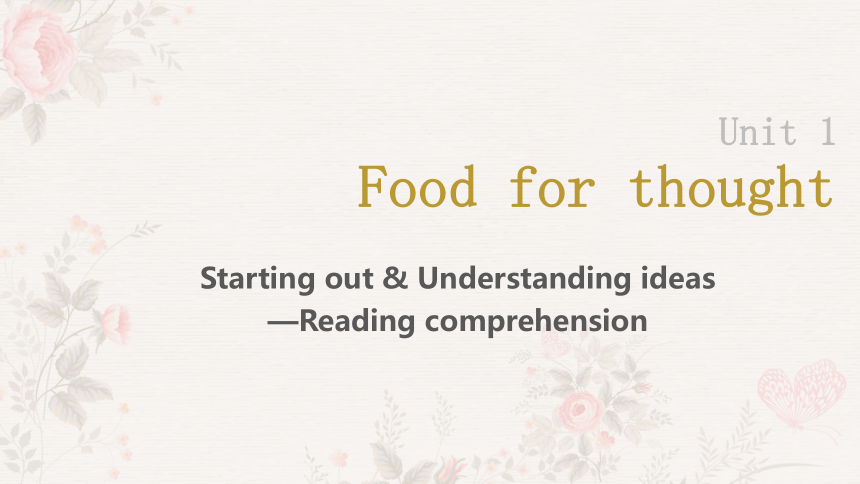
|
|
| 格式 | pptx | ||
| 文件大小 | 10.5MB | ||
| 资源类型 | 教案 | ||
| 版本资源 | 外研版(2019) | ||
| 科目 | 英语 | ||
| 更新时间 | 2023-10-10 00:00:00 | ||
图片预览

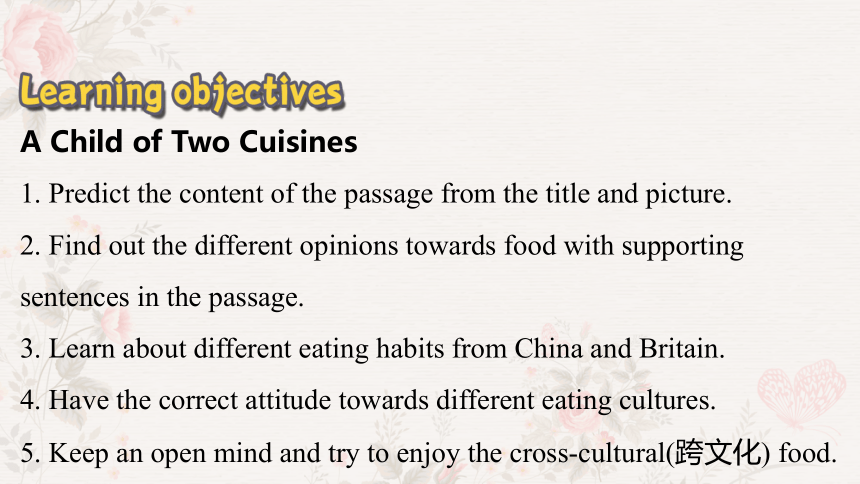
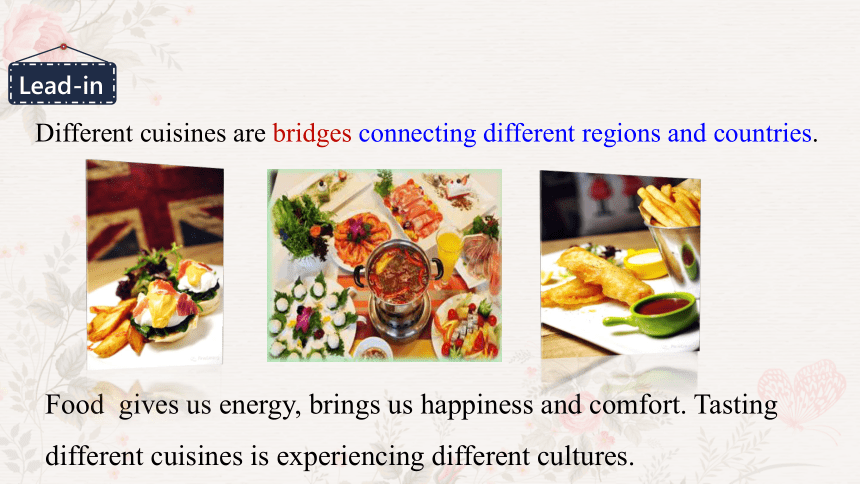
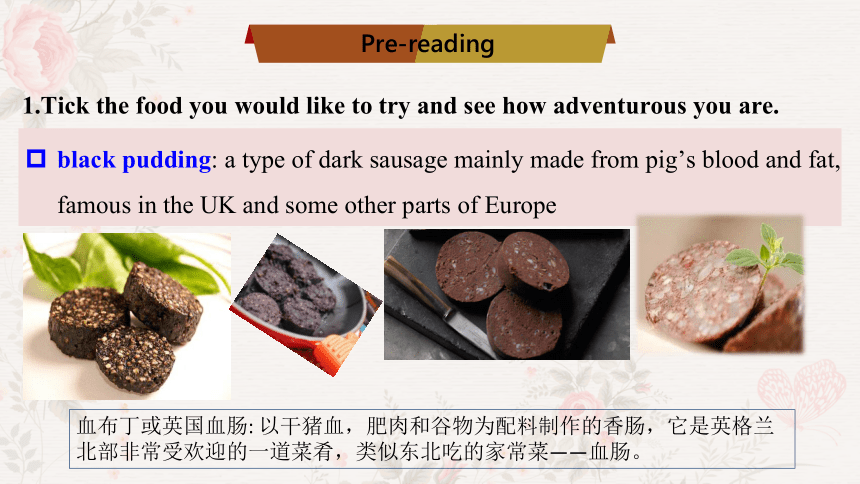
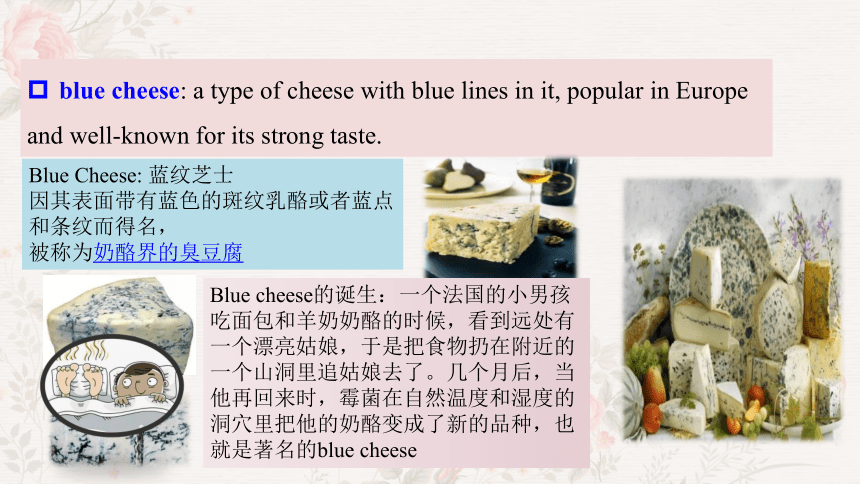
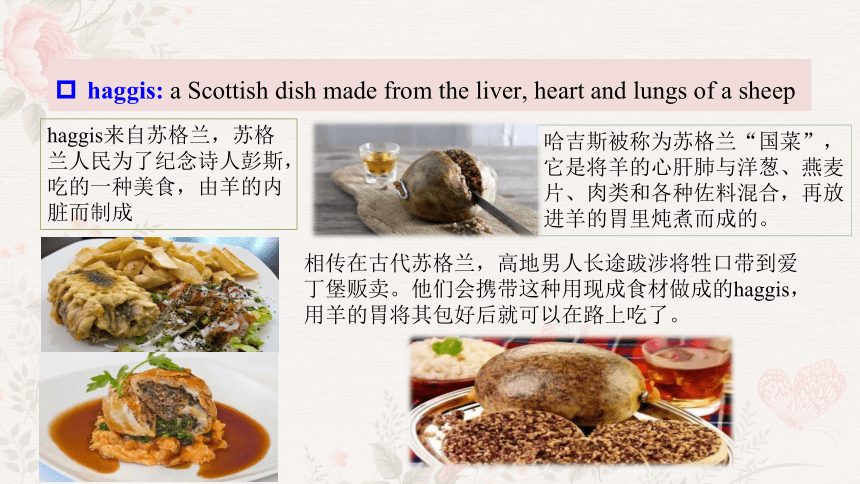
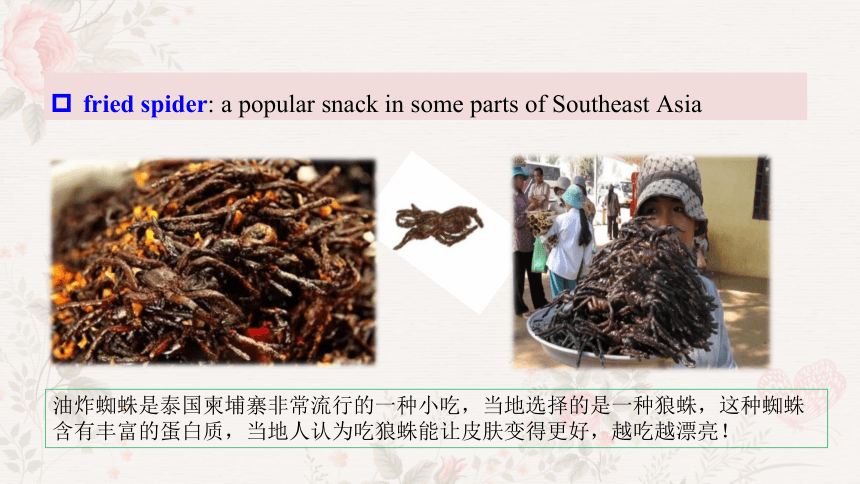
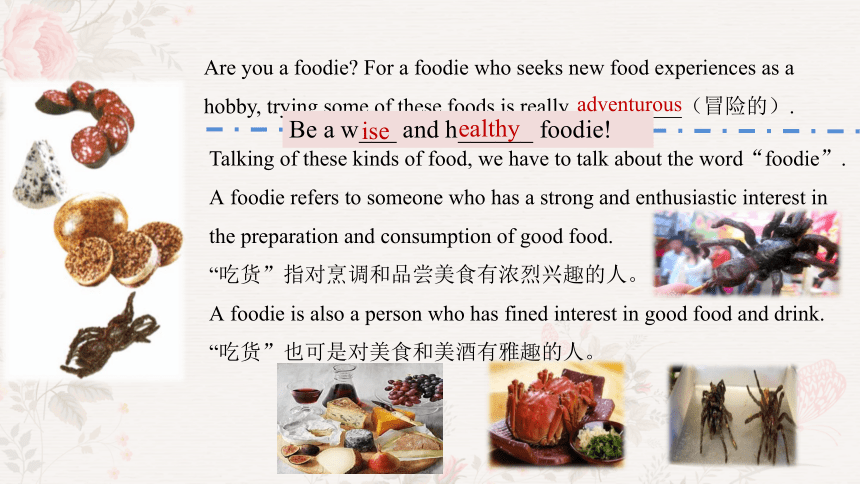
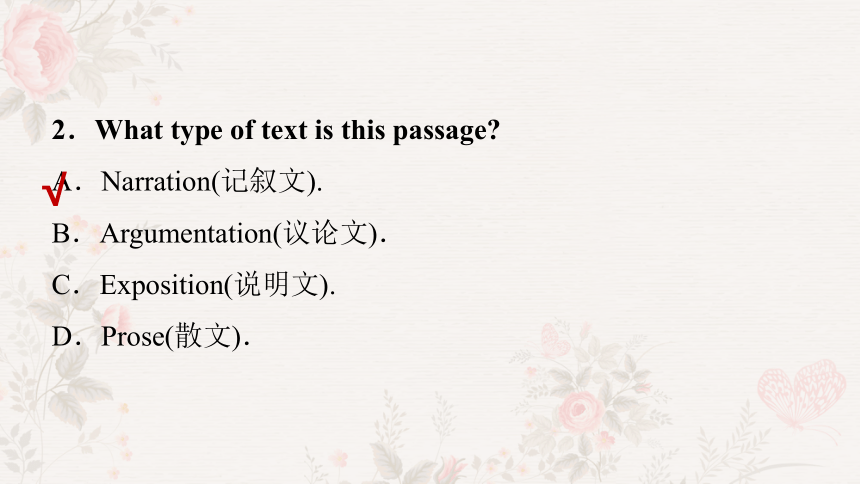
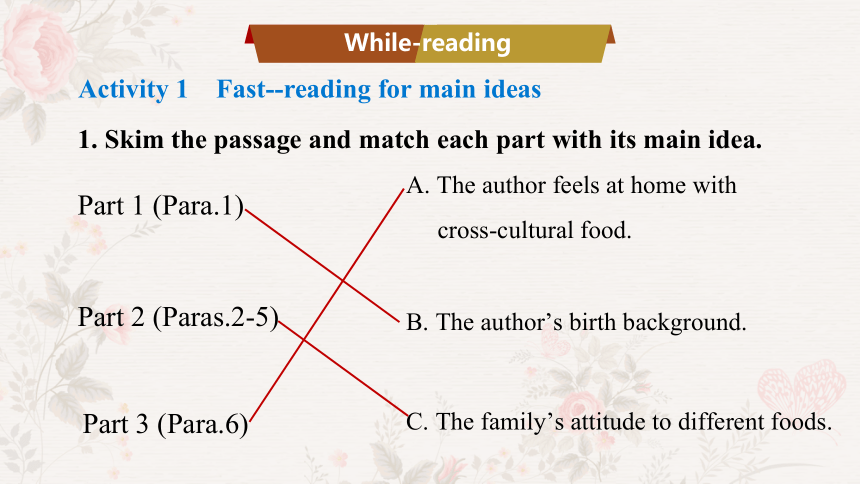
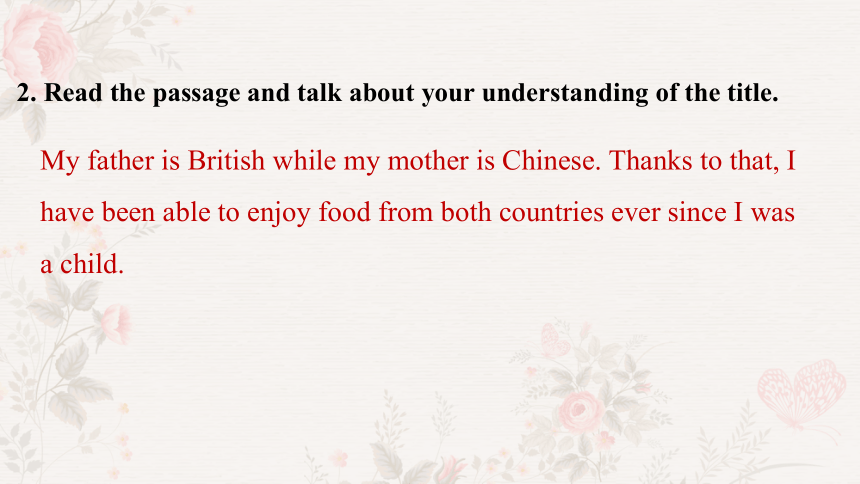
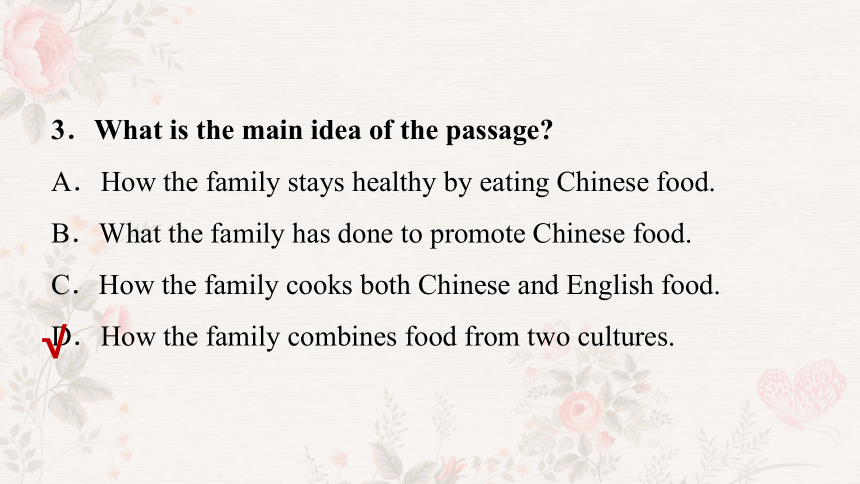
文档简介
(共41张PPT)
Unit 1
Food for thought
Starting out & Understanding ideas
—Reading comprehension
A Child of Two Cuisines
1. Predict the content of the passage from the title and picture.
2. Find out the different opinions towards food with supporting sentences in the passage.
3. Learn about different eating habits from China and Britain.
4. Have the correct attitude towards different eating cultures.
5. Keep an open mind and try to enjoy the cross-cultural(跨文化) food.
Food gives us energy, brings us happiness and comfort. Tasting different cuisines is experiencing different cultures.
Different cuisines are bridges connecting different regions and countries.
Lead-in
1.Tick the food you would like to try and see how adventurous you are.
black pudding: a type of dark sausage mainly made from pig’s blood and fat, famous in the UK and some other parts of Europe
血布丁或英国血肠: 以干猪血,肥肉和谷物为配料制作的香肠,它是英格兰北部非常受欢迎的一道菜肴,类似东北吃的家常菜——血肠。
Pre-reading
blue cheese: a type of cheese with blue lines in it, popular in Europe
and well-known for its strong taste.
Blue Cheese: 蓝纹芝士
因其表面带有蓝色的斑纹乳酪或者蓝点和条纹而得名,
被称为奶酪界的臭豆腐
Blue cheese的诞生:一个法国的小男孩吃面包和羊奶奶酪的时候,看到远处有一个漂亮姑娘,于是把食物扔在附近的一个山洞里追姑娘去了。几个月后,当他再回来时,霉菌在自然温度和湿度的洞穴里把他的奶酪变成了新的品种,也就是著名的blue cheese
haggis: a Scottish dish made from the liver, heart and lungs of a sheep
haggis来自苏格兰,苏格兰人民为了纪念诗人彭斯,吃的一种美食,由羊的内脏而制成
哈吉斯被称为苏格兰“国菜”,它是将羊的心肝肺与洋葱、燕麦片、肉类和各种佐料混合,再放进羊的胃里炖煮而成的。
相传在古代苏格兰,高地男人长途跋涉将牲口带到爱丁堡贩卖。他们会携带这种用现成食材做成的haggis,用羊的胃将其包好后就可以在路上吃了。
油炸蜘蛛是泰国柬埔寨非常流行的一种小吃,当地选择的是一种狼蛛,这种蜘蛛含有丰富的蛋白质,当地人认为吃狼蛛能让皮肤变得更好,越吃越漂亮!
fried spider: a popular snack in some parts of Southeast Asia
Talking of these kinds of food, we have to talk about the word“foodie”.
A foodie refers to someone who has a strong and enthusiastic interest in
the preparation and consumption of good food.
“吃货”指对烹调和品尝美食有浓烈兴趣的人。
A foodie is also a person who has fined interest in good food and drink.
“吃货”也可是对美食和美酒有雅趣的人。
Are you a foodie For a foodie who seeks new food experiences as a hobby, trying some of these foods is really __________(冒险的).
Be a w___ and h______ foodie!
adventurous
ise
ealthy
2.What type of text is this passage
A.Narration(记叙文).
B.Argumentation(议论文).
C.Exposition(说明文).
D.Prose(散文).
√
While-reading
Part 3 (Para.6)
Part 1 (Para.1)
Part 2 (Paras.2-5)
A. The author feels at home with
cross-cultural food.
B. The author’s birth background.
C. The family’s attitude to different foods.
1. Skim the passage and match each part with its main idea.
Activity 1 Fast- reading for main ideas
2. Read the passage and talk about your understanding of the title.
My father is British while my mother is Chinese. Thanks to that, I have been able to enjoy food from both countries ever since I was a child.
3.What is the main idea of the passage
A.How the family stays healthy by eating Chinese food.
B.What the family has done to promote Chinese food.
C.How the family cooks both Chinese and English food.
D.How the family combines food from two cultures.
√
1.Which word expresses my attitude to Chinese food and British food
Enjoyed. This is a mixture between eastern and western cultures.
Para. 1
Activity 2 Careful- reading for details
2. What can we infer from the first paragraph
A.The author has been brought up in China.
B.The author only enjoys eating British food.
C.The author doesn't know how to use chopsticks.
D.The author, a mixed-race child, has grown up in England.
√
Mum likes spicy dishes or hot dishes, and often cooks them.
Dad _______________hot pot! _____there are still some dishes that Dad ___________even after many years of marriage to my mother. He was ________ and _______
how the Chinese ate almost____________________.
has come to love
But
dare not try
surprised
shocked
every part of an animal
2. What is Dad's feeling
1. What are Mum's sweet memories of the food from her home town in Sichuan
Para. 2
3. Paraphrase:
Even today, he still does not easily take to eating things like chicken feet.
Even today, he still doesn’t get used to eating things like chicken feet
1. What happened in the butcher's
The author was misunderstood by the butcher when he asked for pigs’ ears.
2. Why did the butcher think the author was joking
Because in his opinion pigs' ears can not be eaten. British eating culture differs from Chinese eating culture.
Para. 3
1. Dad can cook a _____ “full English breakfast” and a _______Sunday roast.
2. What is Mum's opinion about roast food
Mum says we’d better not eat __________roast food as it may make us _______________inside our bodies, according to _______________________.
super
typical
too much
suffer from heat
traditional Chinese medicine
Para. 4
3.Breakfast like a king, lunch like a prince, supper like a pauper.
For British people, a sense of ceremony of ordinary life starts with
a full English breakfast.
传统的英式早餐:英式早餐全餐(Full English Breakfast)。一份完整且足够传统的英式早餐可以算是世界上最丰盛的早餐之一,培根、香肠、鸡蛋(可以是煎蛋、炒蛋、水波蛋)、茄汁焗豆(baked beans)、吐司、煎蘑菇、炸薯块/薯饼(hash browns)、烤番茄,都是Full English Breakfast中不可或缺的食物。
根据地域和口味的不同,其“内容”中还会加入哈吉斯、菠菜、苦菊、松饼、贝果等。英式早餐全餐中食物的烹调方法几乎全部为煎制,通常会佐以肉汁或茄汁,煎蛋上撒点黑胡椒,烤吐司要抹上黄油,再配上黑咖啡和英式红茶。
Culture bag
文化袋
1.My first visit to China is____________.
2.When the author came to China for the first time, .
A.he was encouraged to try different kinds of food by his father
B.he could deal with all kinds of Chinese food easily
C.his mother encouraged him to try stinky tofu
D.he didn't like the appearance and smell of stinky tofu at first
unforgettable
√
Para. 5
3. Find out the expressions describing the experience of the author’s first visit to China and then retell this experience.
encourage
deal with
come across
gather all my courage
take a bite
be amazed
remind me of
either love or hate
fall in love with
stinky tofu
blue cheese
1. One man’s meat is another man’s poison.
What is the rhetorical device (修辞手法)of this sentence
A.Metaphor (比喻). B.Repetition(重复).
C.Parallelism(排比). D.Personification(拟人).
“Meat” means something one person______ and “poison” means something another person__________________.
这句话用meat 肉比喻一个人喜欢的东西,用poison 毒药比喻另一人不喜欢的东西。引申义为:萝卜青菜,各有所爱。
likes
doesn’t like/ dislikes
√
Para. 6
2. What does the author mean by saying “one man’s meat is another man’s poison”?
It is used to say that something one person likes may not be liked by someone else.
Do you know of any similar sayings
Tastes differ/vary.
No dish suits all tastes.
You can never make everyone happy.
3. Find out one sentence showing the author’s opinion on cross-cultural eating habit.
There’s nothing better than a cross-cultural afternoon tea of English biscuits and a cup of Chinese oolong tea in a fine china cup.
Afternoon tea午后茶点(通常包括蛋糕和茶)
Afternoon tea is a small meal eaten in the late afternoon, usually including cake and a cup of tea.
Afternoon tea includes low tea, high tea and royal tea.
Afternoon tea is also called “low tea” as it is served at a low table.
Afternoon tea is also called “high tea” as it is served at a high table.
Royal tea is a social tea which starts with champagne(香槟酒) or sherry(雪莉酒) and ends with tea.
4. Paraphrase:
I feel at home with food from both my cultures.
The food from both my cultures suits my taste and I like it.
Analyse(分析) the structure
I ______________ food from both my cultures.
a British father
a Chinese mother
______________________________
A Child of Two Cuisines
______________, Animal parts, Stinky tofu
_________________
C____________ cusines
British cuisine/food
Full British breakfast
Sunday roast
Sichuan hot pot
ross-cultural
feel at home with
Chinese cuisine/food
Post-reading
Food that everyone likes is not ________ because their life habits are _______ and they come from ________________________. So we should _________ the differences, _______ the beauty of the differences, ______ the differences and be better together. Just keep an _____ mind and try to enjoy them in ___________ environment!
the same
different
different countries and regions
understand
respect
share
open
cross-cultural
Activity 1 Discussion
1.How do you understand the saying “one man’s meat is another man’s poison”? (Critical thinking)
admit
understand
respect
try
accept/enjoy
tolerant
2. Faced with different food you never met before, what should you do?(Creative thinking)
(1)Believe in the saying “one man’s meat is another man’s poison”.
(2)Accept food from different cultures.
________(grow) up in England, I am mixed-race child with a Chinese mother and a British father. So, I ____________(enjoy) ood from both countries since I was able to hold a knife and fork—and chopsticks.
My mother comes from Sichuan. She often cooks spicy dishes that my father sometimes dare not try even after many years of __________(marry) to my mother.
As to my father,he can cook a super “full English breakfast” of bacon,eggs and so on. However,my mother told _____ not to eat too much roast food,_____ can make us suffer _____ heat inside our bodies.
Growing
have enjoyed
marriage
Activity 2 Summary
from
us
which
When I first paid _____ visit to China, my mother __________ me to try different sorts of food. I came across stinky tofu,which impressed me most. It looked and smelt like a _________(burn) sports shoe but it tasted good.
Anyway, I love food from both countries and there is nothing_______(good) than it.
encouraged
a
burnt
better
A Child of Two Cuisines
享受跨国美食的孩子
Growing up in England with a British father and a Chinese mother, I’ve enjoyed food from both countries ever since I was able to hold a knife and fork—and chopsticks!
动名词短语作状语
=since 引导时间状语从句
现在完成时
Activity 3 Analyze the key points of the text
Para. 1
Mum has sweet memories of the food from her home town in Sichuan,
and often cooks spicy dishes. Thanks to this, Dad has come to love hot pot!
But there are still some dishes that Dad dare not try even after many years
of marriage to my mother. He once told me he was surprised by what he
saw on the table when he first visited my mother’s parents in China. He was
even shocked at their wedding when he saw how the Chinese ate almost
every part of an animal. Even today, he still does not easily take to eating
things like chicken feet.
介词短语作后置定语
逐渐喜欢
(that)引导的定语从句,不能用which代替
习惯于
=get/become used to
省略that的宾语从句
what引导的宾语从句
when引导的时间状语从句
Para. 2
take to doing sth:
start doing something regularly or as a habit
Tom has taken to going jogging every morning.
Tom习惯于每天早晨慢跑锻炼。
take to sb./sth.
start to like someone or something
Para. 2
But I enjoy that sort of food myself. Last week, I went to the butcher’s and asked, “Do you have pigs’ ears ” “No,” the butcher said, pulling at his own ears, “just these ordinary ones.” He must have thought I was joking.
He fell asleep in class. He must have stayed up studying last night.
他上课睡着了,昨晚他肯定熬夜学习。
现在分词短语作状语
must have done想必一定
表对过去或已经发生事情的肯定推测
Para. 3
Dad can cook a super “full English breakfast” of bacon, eggs, beans, sausages and toast with butter—Mum and I just have to find a way to get him into the kitchen! He also does a typical Sunday roast. We all love roast beef
and vegetables, but Mum says we’d better not eat too much roast food as it may make us suffer from heat inside our bodies, according to traditional Chinese medicine.
介词短语作后置定语
as引导原因状语从句
but连接并列句
省略that的宾语从句
Para. 4
I’ll never forget my first visit to China. Mum encouraged me to try different kinds of food, and I did! I loved everything. But just when I thought I could deal with all Chinese food, I came across stinky tofu, a horrible grey thing that looked and smelt like a burnt sports shoe. “You needn’t try it if you don’t want to,” Mum said, but I gathered all my courage to take a bite and was amazed to find it wasn’t so bad. It reminded me of blue cheese, a similarly strong smelling type of food you either love or hate. Maybe I’ll fall in love with stinky tofu—someday.
同位语
that=which引导的定语从句
同位语
定语从句
when引导的时间状语从句
省略that的宾语从句
Para. 5
remind sb. of sth.使某人想起某事
People say that one man’s meat is another man’s poison, but I feel at home with food from both my cultures. To me, there’s nothing better than a cross-cultural afternoon tea of English biscuits and a cup of Chinese oolong tea in a fine china cup.
否定词与比较级连用表最高级
there’s nothing better than…=there’s nothing like…
什么都比不上……;……非常好
舒服自在;对某事开心或有信心
Paraphrase the last sentence
To me, an afternoon tea involving two different cultures is the best!It consists of English biscuits and a cup of Chinese oolong tea in a beautiful and delicate china cup.
Para. 6
一句多译
炎热的日子里,什么都比不上喝杯冰镇饮料。
There’s nothing like an ice-cold drink on a hot day.
There’s nothing better than an ice-cold drink on a hot day.
An ice-cold drink is the best on a hot day.
否定词与比较级连用表最高级
Para. 6
Preview language points and recite
the key points of the text.
Homework
Unit 1
Food for thought
Starting out & Understanding ideas
—Reading comprehension
A Child of Two Cuisines
1. Predict the content of the passage from the title and picture.
2. Find out the different opinions towards food with supporting sentences in the passage.
3. Learn about different eating habits from China and Britain.
4. Have the correct attitude towards different eating cultures.
5. Keep an open mind and try to enjoy the cross-cultural(跨文化) food.
Food gives us energy, brings us happiness and comfort. Tasting different cuisines is experiencing different cultures.
Different cuisines are bridges connecting different regions and countries.
Lead-in
1.Tick the food you would like to try and see how adventurous you are.
black pudding: a type of dark sausage mainly made from pig’s blood and fat, famous in the UK and some other parts of Europe
血布丁或英国血肠: 以干猪血,肥肉和谷物为配料制作的香肠,它是英格兰北部非常受欢迎的一道菜肴,类似东北吃的家常菜——血肠。
Pre-reading
blue cheese: a type of cheese with blue lines in it, popular in Europe
and well-known for its strong taste.
Blue Cheese: 蓝纹芝士
因其表面带有蓝色的斑纹乳酪或者蓝点和条纹而得名,
被称为奶酪界的臭豆腐
Blue cheese的诞生:一个法国的小男孩吃面包和羊奶奶酪的时候,看到远处有一个漂亮姑娘,于是把食物扔在附近的一个山洞里追姑娘去了。几个月后,当他再回来时,霉菌在自然温度和湿度的洞穴里把他的奶酪变成了新的品种,也就是著名的blue cheese
haggis: a Scottish dish made from the liver, heart and lungs of a sheep
haggis来自苏格兰,苏格兰人民为了纪念诗人彭斯,吃的一种美食,由羊的内脏而制成
哈吉斯被称为苏格兰“国菜”,它是将羊的心肝肺与洋葱、燕麦片、肉类和各种佐料混合,再放进羊的胃里炖煮而成的。
相传在古代苏格兰,高地男人长途跋涉将牲口带到爱丁堡贩卖。他们会携带这种用现成食材做成的haggis,用羊的胃将其包好后就可以在路上吃了。
油炸蜘蛛是泰国柬埔寨非常流行的一种小吃,当地选择的是一种狼蛛,这种蜘蛛含有丰富的蛋白质,当地人认为吃狼蛛能让皮肤变得更好,越吃越漂亮!
fried spider: a popular snack in some parts of Southeast Asia
Talking of these kinds of food, we have to talk about the word“foodie”.
A foodie refers to someone who has a strong and enthusiastic interest in
the preparation and consumption of good food.
“吃货”指对烹调和品尝美食有浓烈兴趣的人。
A foodie is also a person who has fined interest in good food and drink.
“吃货”也可是对美食和美酒有雅趣的人。
Are you a foodie For a foodie who seeks new food experiences as a hobby, trying some of these foods is really __________(冒险的).
Be a w___ and h______ foodie!
adventurous
ise
ealthy
2.What type of text is this passage
A.Narration(记叙文).
B.Argumentation(议论文).
C.Exposition(说明文).
D.Prose(散文).
√
While-reading
Part 3 (Para.6)
Part 1 (Para.1)
Part 2 (Paras.2-5)
A. The author feels at home with
cross-cultural food.
B. The author’s birth background.
C. The family’s attitude to different foods.
1. Skim the passage and match each part with its main idea.
Activity 1 Fast- reading for main ideas
2. Read the passage and talk about your understanding of the title.
My father is British while my mother is Chinese. Thanks to that, I have been able to enjoy food from both countries ever since I was a child.
3.What is the main idea of the passage
A.How the family stays healthy by eating Chinese food.
B.What the family has done to promote Chinese food.
C.How the family cooks both Chinese and English food.
D.How the family combines food from two cultures.
√
1.Which word expresses my attitude to Chinese food and British food
Enjoyed. This is a mixture between eastern and western cultures.
Para. 1
Activity 2 Careful- reading for details
2. What can we infer from the first paragraph
A.The author has been brought up in China.
B.The author only enjoys eating British food.
C.The author doesn't know how to use chopsticks.
D.The author, a mixed-race child, has grown up in England.
√
Mum likes spicy dishes or hot dishes, and often cooks them.
Dad _______________hot pot! _____there are still some dishes that Dad ___________even after many years of marriage to my mother. He was ________ and _______
how the Chinese ate almost____________________.
has come to love
But
dare not try
surprised
shocked
every part of an animal
2. What is Dad's feeling
1. What are Mum's sweet memories of the food from her home town in Sichuan
Para. 2
3. Paraphrase:
Even today, he still does not easily take to eating things like chicken feet.
Even today, he still doesn’t get used to eating things like chicken feet
1. What happened in the butcher's
The author was misunderstood by the butcher when he asked for pigs’ ears.
2. Why did the butcher think the author was joking
Because in his opinion pigs' ears can not be eaten. British eating culture differs from Chinese eating culture.
Para. 3
1. Dad can cook a _____ “full English breakfast” and a _______Sunday roast.
2. What is Mum's opinion about roast food
Mum says we’d better not eat __________roast food as it may make us _______________inside our bodies, according to _______________________.
super
typical
too much
suffer from heat
traditional Chinese medicine
Para. 4
3.Breakfast like a king, lunch like a prince, supper like a pauper.
For British people, a sense of ceremony of ordinary life starts with
a full English breakfast.
传统的英式早餐:英式早餐全餐(Full English Breakfast)。一份完整且足够传统的英式早餐可以算是世界上最丰盛的早餐之一,培根、香肠、鸡蛋(可以是煎蛋、炒蛋、水波蛋)、茄汁焗豆(baked beans)、吐司、煎蘑菇、炸薯块/薯饼(hash browns)、烤番茄,都是Full English Breakfast中不可或缺的食物。
根据地域和口味的不同,其“内容”中还会加入哈吉斯、菠菜、苦菊、松饼、贝果等。英式早餐全餐中食物的烹调方法几乎全部为煎制,通常会佐以肉汁或茄汁,煎蛋上撒点黑胡椒,烤吐司要抹上黄油,再配上黑咖啡和英式红茶。
Culture bag
文化袋
1.My first visit to China is____________.
2.When the author came to China for the first time, .
A.he was encouraged to try different kinds of food by his father
B.he could deal with all kinds of Chinese food easily
C.his mother encouraged him to try stinky tofu
D.he didn't like the appearance and smell of stinky tofu at first
unforgettable
√
Para. 5
3. Find out the expressions describing the experience of the author’s first visit to China and then retell this experience.
encourage
deal with
come across
gather all my courage
take a bite
be amazed
remind me of
either love or hate
fall in love with
stinky tofu
blue cheese
1. One man’s meat is another man’s poison.
What is the rhetorical device (修辞手法)of this sentence
A.Metaphor (比喻). B.Repetition(重复).
C.Parallelism(排比). D.Personification(拟人).
“Meat” means something one person______ and “poison” means something another person__________________.
这句话用meat 肉比喻一个人喜欢的东西,用poison 毒药比喻另一人不喜欢的东西。引申义为:萝卜青菜,各有所爱。
likes
doesn’t like/ dislikes
√
Para. 6
2. What does the author mean by saying “one man’s meat is another man’s poison”?
It is used to say that something one person likes may not be liked by someone else.
Do you know of any similar sayings
Tastes differ/vary.
No dish suits all tastes.
You can never make everyone happy.
3. Find out one sentence showing the author’s opinion on cross-cultural eating habit.
There’s nothing better than a cross-cultural afternoon tea of English biscuits and a cup of Chinese oolong tea in a fine china cup.
Afternoon tea午后茶点(通常包括蛋糕和茶)
Afternoon tea is a small meal eaten in the late afternoon, usually including cake and a cup of tea.
Afternoon tea includes low tea, high tea and royal tea.
Afternoon tea is also called “low tea” as it is served at a low table.
Afternoon tea is also called “high tea” as it is served at a high table.
Royal tea is a social tea which starts with champagne(香槟酒) or sherry(雪莉酒) and ends with tea.
4. Paraphrase:
I feel at home with food from both my cultures.
The food from both my cultures suits my taste and I like it.
Analyse(分析) the structure
I ______________ food from both my cultures.
a British father
a Chinese mother
______________________________
A Child of Two Cuisines
______________, Animal parts, Stinky tofu
_________________
C____________ cusines
British cuisine/food
Full British breakfast
Sunday roast
Sichuan hot pot
ross-cultural
feel at home with
Chinese cuisine/food
Post-reading
Food that everyone likes is not ________ because their life habits are _______ and they come from ________________________. So we should _________ the differences, _______ the beauty of the differences, ______ the differences and be better together. Just keep an _____ mind and try to enjoy them in ___________ environment!
the same
different
different countries and regions
understand
respect
share
open
cross-cultural
Activity 1 Discussion
1.How do you understand the saying “one man’s meat is another man’s poison”? (Critical thinking)
admit
understand
respect
try
accept/enjoy
tolerant
2. Faced with different food you never met before, what should you do?(Creative thinking)
(1)Believe in the saying “one man’s meat is another man’s poison”.
(2)Accept food from different cultures.
________(grow) up in England, I am mixed-race child with a Chinese mother and a British father. So, I ____________(enjoy) ood from both countries since I was able to hold a knife and fork—and chopsticks.
My mother comes from Sichuan. She often cooks spicy dishes that my father sometimes dare not try even after many years of __________(marry) to my mother.
As to my father,he can cook a super “full English breakfast” of bacon,eggs and so on. However,my mother told _____ not to eat too much roast food,_____ can make us suffer _____ heat inside our bodies.
Growing
have enjoyed
marriage
Activity 2 Summary
from
us
which
When I first paid _____ visit to China, my mother __________ me to try different sorts of food. I came across stinky tofu,which impressed me most. It looked and smelt like a _________(burn) sports shoe but it tasted good.
Anyway, I love food from both countries and there is nothing_______(good) than it.
encouraged
a
burnt
better
A Child of Two Cuisines
享受跨国美食的孩子
Growing up in England with a British father and a Chinese mother, I’ve enjoyed food from both countries ever since I was able to hold a knife and fork—and chopsticks!
动名词短语作状语
=since 引导时间状语从句
现在完成时
Activity 3 Analyze the key points of the text
Para. 1
Mum has sweet memories of the food from her home town in Sichuan,
and often cooks spicy dishes. Thanks to this, Dad has come to love hot pot!
But there are still some dishes that Dad dare not try even after many years
of marriage to my mother. He once told me he was surprised by what he
saw on the table when he first visited my mother’s parents in China. He was
even shocked at their wedding when he saw how the Chinese ate almost
every part of an animal. Even today, he still does not easily take to eating
things like chicken feet.
介词短语作后置定语
逐渐喜欢
(that)引导的定语从句,不能用which代替
习惯于
=get/become used to
省略that的宾语从句
what引导的宾语从句
when引导的时间状语从句
Para. 2
take to doing sth:
start doing something regularly or as a habit
Tom has taken to going jogging every morning.
Tom习惯于每天早晨慢跑锻炼。
take to sb./sth.
start to like someone or something
Para. 2
But I enjoy that sort of food myself. Last week, I went to the butcher’s and asked, “Do you have pigs’ ears ” “No,” the butcher said, pulling at his own ears, “just these ordinary ones.” He must have thought I was joking.
He fell asleep in class. He must have stayed up studying last night.
他上课睡着了,昨晚他肯定熬夜学习。
现在分词短语作状语
must have done想必一定
表对过去或已经发生事情的肯定推测
Para. 3
Dad can cook a super “full English breakfast” of bacon, eggs, beans, sausages and toast with butter—Mum and I just have to find a way to get him into the kitchen! He also does a typical Sunday roast. We all love roast beef
and vegetables, but Mum says we’d better not eat too much roast food as it may make us suffer from heat inside our bodies, according to traditional Chinese medicine.
介词短语作后置定语
as引导原因状语从句
but连接并列句
省略that的宾语从句
Para. 4
I’ll never forget my first visit to China. Mum encouraged me to try different kinds of food, and I did! I loved everything. But just when I thought I could deal with all Chinese food, I came across stinky tofu, a horrible grey thing that looked and smelt like a burnt sports shoe. “You needn’t try it if you don’t want to,” Mum said, but I gathered all my courage to take a bite and was amazed to find it wasn’t so bad. It reminded me of blue cheese, a similarly strong smelling type of food you either love or hate. Maybe I’ll fall in love with stinky tofu—someday.
同位语
that=which引导的定语从句
同位语
定语从句
when引导的时间状语从句
省略that的宾语从句
Para. 5
remind sb. of sth.使某人想起某事
People say that one man’s meat is another man’s poison, but I feel at home with food from both my cultures. To me, there’s nothing better than a cross-cultural afternoon tea of English biscuits and a cup of Chinese oolong tea in a fine china cup.
否定词与比较级连用表最高级
there’s nothing better than…=there’s nothing like…
什么都比不上……;……非常好
舒服自在;对某事开心或有信心
Paraphrase the last sentence
To me, an afternoon tea involving two different cultures is the best!It consists of English biscuits and a cup of Chinese oolong tea in a beautiful and delicate china cup.
Para. 6
一句多译
炎热的日子里,什么都比不上喝杯冰镇饮料。
There’s nothing like an ice-cold drink on a hot day.
There’s nothing better than an ice-cold drink on a hot day.
An ice-cold drink is the best on a hot day.
否定词与比较级连用表最高级
Para. 6
Preview language points and recite
the key points of the text.
Homework
